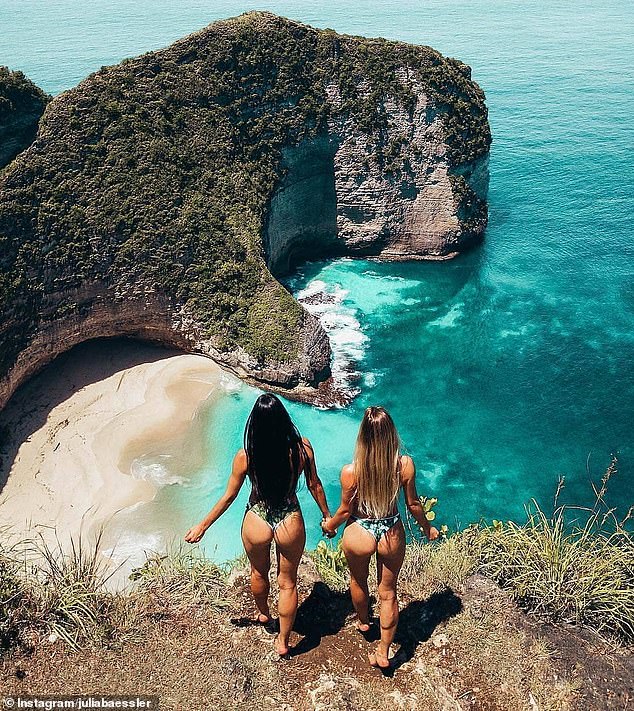With its towering limestone clifftops and crystal clear turquoise water, Kelingking is regularly ranked as the world’s most beautiful beach.
But few tourists actually reach the pristine white sands on the Indonesian idyll of Nusa Penida, a short boat ride from Bali.
That’s because the beach can only be accessed by a gruelling 30-minute descent down hundreds of rickety steps carved into the steep hillside.
That is all set to change, however, with the development of a 182-metre glass elevator and viewing platform being built down the sheer cliff face.
The project, which is being spearheaded by the local government with the help of a Chinese company, has come to symbolise the tension between Bali’s natural, untouched beauty and the drive for modern development to attract wealthy foreign tourists.
Niluh Djelantik, a recently-elected senator and prominent social media activist in Bali, slammed the eyesore, which will be almost three times taller than the Sydney Opera House.
‘You could give me $100 million and I still would never ever ride on that elevator,’ Ms Djelantik told the ABC.
‘Kelingking Beach is beautiful the way it is, and for some people, enjoying it means they have to put some effort in to hike down to see the beauty at the bottom.’
With its towering limestone clifftops and crystal clear turquoise water, Kelingking is regularly ranked as the world’s most beautiful beach
But few tourists actually reach the pristine white sands on the Indonesian idyll of Nusa Penida, a short boat ride from Bali, because the beach can only be accessed by a gruelling 30-minute descent down hundreds of rickety steps carved into the steep hillside
‘You have to earn it, you don’t just put a lift there.’
The issue of over-development has divided Indonesia, with the government on Monday introducing a temporary ban on building hotels, villas and nightclubs in some busy areas of Bali.
Theses areas include Denpasar, Badung, Gianyar, and Tabanan, typical destinations of many Aussie holidaymakers.
Sang Made Mahendra Jaya, the island’s interim governor, said he wanted to ‘reform’ tourism and suggested the ban could last for up to two years – but could stretch to a decade.
About 200,000 foreigners currently live in Bali and have created problems such as crime, over-development and competition for employment, Luhut Pandjaitan, senior minister overseeing tourism, said on his Instagram page last month.
‘Foreign tourists who bring problem here, such as narcotics, gangs, and other issues, we can deport them from Indonesia, from Bali, and we don’t want them to enter Bali anymore,’ he said, speaking in English in a video clip.
The construction pause is part of the government’s drive to reform tourism on Bali by concentrating on sustainability and quality jobs, while preserving the island’s culture.
Mr Pandjaitan said ‘quality was more important than numbers’.
‘We don’t want to see paddy fields become a villa or become a nude club,’ he said at the Indonesia Quality Tourism Conference last month.
The untouched beauty of Kelingking Beach is all set to change, however, with the development of a 182-metre glass elevator and viewing platform being built down the sheer cliff face (pictured: an artist’s representation)
The project, which is being spearheaded by the local government with the help of a Chinese company, has come to symbolise the tension between Bali’s natural, untouched beauty and the drive for modern development to attract wealthy foreign tourists
He added: ‘We want to maintain Balinese culture because Bali, without their culture, is no longer Bali as a paradise island.’
Foreign arrivals in Bali have surged since it re-opened for tourism after the COVID-19 pandemic. Videos of misbehaving tourists often go viral, angering residents and sparking harsh responses from social media users in Indonesia.
Government figures show 2.9 million foreign visitors arrived through Bali airport in the first half of the year, making up 65 per cent of total foreign arrivals in Indonesia by air.
There were 541 hotels in Bali last year, the figures show, up from 507 in 2019.
